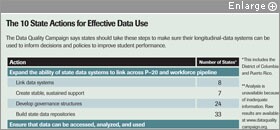States have made progress in building data systems that track student performance over time, but are behind the curve in sharing the information in a way that leads to meaningful decisionmaking, a released last week suggests.
The , a foundation-funded organization in Washington that promotes and tracks the use of data in education, has been focused since 2005 on identifying the key components of state data systems and pushing for their development. Now that much of that work is under way, the group is shifting its focus to describe and promote the use of the data.
“The education sector is on the cusp of becoming an information-based enterprise,” the survey report from the group says. “But reaching this goal depends on states taking actions that change the historically entrenched culture of using data for compliance reporting into one that values analysis of data and prioritizes constant communication to all stakeholders of the education system.”
The movement to create state data systems got a boost from the American Recovery and Reinvestment Act, because states had to agree to complete their data systems by 2011 in order to receive money from the stimulus act’s State Fiscal Stabilization Fund.
This year’s survey marks the first time the DQC has released information on states’ efforts in 10 areas the group believes will make data use more prevalent.
The Data Quality Campaign says states should take these steps to make sure their longitudinal-data systems can be used to inform decisions and policies to improve student performance.

SOURCE: Data Quality Campaign
“While it is a monumental task to build the infrastructure to do this, it is an even more monumental task to help people understand how to access this information, how to use the information, and to change the education culture to teach people how to take this information into account on a daily basis,” said Aimee R. Guidera, the executive director of the Data Quality Campaign.
With federal stimulus money driving the construction of the systems, Ms. Guidera said, state policymakers need to seize the opportunity to make them so useful that education leaders will be willing to fight for sustaining the data infrastructure in coming years, when state budgets will be cash-strapped and funding will be harder to maintain.
More Work to Do
In a November survey, the DQC reported that 44 states collect data that can identify the schools producing the strongest academic growth for students, up from 21 states in 2005. In addition, 47 states now have the components needed to calculate a longitudinal graduation rate using the method agreed upon in a National Governors Association compact in 2005. (“Report Finds States on Course to Build Pupil-Data Systems,” Dec. 2, 2009.)
The new report specifies 10 state actions necessary for effective data use. But 43 states have taken three or fewer of the actions, which call for states to expand their data systems to include higher education and workforce information; ensure that the data can be accessed, analyzed, and used; and build the capacity of stakeholders to use the data.
Just eight states had linked their K-12 data systems with others in the state, for example, including postsecondary education, workforce information, and social-service agencies, the survey found. They are required to create such linkages to receive money from the second phase of the State Fiscal Stabilization Fund, the report notes.
The group will offer technical assistance to states for the development of policy frameworks that allow for easier integration of data collected across state agencies into a useful format, Ms. Guidera said.
To help highlight the type of leadership the DQC believes is necessary, it last week honored policymakers and educators who have made substantial progress in promoting data use.
Mickey Garrison, the school improvement director for Oregon’s Education Enterprise Steering Committee, was named as state data director of the year for her work as the training director for the Oregon Direct Access to Achievement, or , project, which has brought together the state’s education department, universities, school districts, and others to focus on making sure teachers are trained in how to use data in a way that helps them improve instruction.
Ms. Garrison said the project set out to bridge a critical gap for educators in the state’s 198 districts.
“Data is in the forefront in education,” she said in an interview. “Teachers and administrators are being told to use data to do program evaluations, to align their curriculum, and to ensure they are meeting students’ needs. But often what we do in education is, we identify what people need to do, but we don’t help them understand how to do it.”
For his efforts in promoting the power of data in schools, Peter Gorman, the superintendent of the Charlotte-Mecklenburg, N.C., school district, was named data leader of the year.
A group of four Illinois policymakers won the award for state policymaker of the year for pulling together their state’s education community to get a bill passed guiding the construction and use of a longitudinal-data system. Enacted last year, the law requires the state to collect student records and integrate them with management tools.
“We wanted to celebrate the collaborative leadership of that work and the fact it was very public,” Ms. Guidera said.




